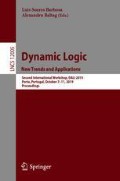Abstract
We present a dynamic logic for inductive learning from partial observations by a “rational” learner, that obeys AGM postulates for belief revision. We apply our logic to an example, showing how various concrete properties can be learnt with certainty or inductively by such an AGM learner. We present a sound and complete axiomatization, based on a combination of relational and neighbourhood version of the canonical model method.
Access this chapter
Tax calculation will be finalised at checkout
Purchases are for personal use only
Notes
- 1.
Indeed, our observational events can be seen as corresponding to a special type of (single-agent) epistemic events in the so-called BMS style.
- 2.
A total preorder \(\le \) on X is a reflexive and transitive binary relation such that every two points are comparable: for all \(x, y\in X\), either \(x\le y\) or \(y\le x\) (or both).
- 3.
Since \(\le \) is a total preorder, this definition coincides with the standard definition of maximal elements as \(Max_\le (O):=\{x\in O : \forall y\in O(x\le y \text{ implies } x\le y)\}\).
- 4.
This is a standard method in Dynamic Epistemic Logic and we refer the reader to [18, Chap. 7.4] for further details.
- 5.
When we quantify over learners, learnability with certainty (by some learners) matches the standard concept of “finite identifiability” from Formal Learning Theory.
- 6.
When we quantify over learners, inductive learnability (by some learners) matches the standard concept of “identifiability in the limit” from Formal Learning Theory, see e.g. [13].
- 7.
We use \(\preceq \) to denote the plausibility order in this frame, to distinguish it from the natural order on \(X\subseteq R\).
References
Alchourrón, C.E., Gärdenfors, P., Makinson, D.: On the logic of theory change: partial meet contraction and revision functions. J. Symb. Log. 50, 510–530 (1985)
Balbiani, P., Baltag, A., van Ditmarsch, H., Herzig, A., Hoshi, T., de Lima, T.: ‘Knowable’ as ‘known after an announcement’. Rev. Symb. Log. 1, 305–334 (2008)
Baltag, A., Gierasimczuk, N., Özgün, A., Vargas Sandoval, A.L., Smets, S.: A dynamic logic for learning theory. In: Madeira, A., Benevides, M. (eds.) DALI 2017. LNCS, vol. 10669, pp. 35–54. Springer, Cham (2018). https://doi.org/10.1007/978-3-319-73579-5_3
Baltag, A., Gierasimczuk, N., Smets, S.: Belief revision as a truth-tracking process. In: Proceedings of the 13th Conference on Theoretical Aspects of Rationality and Knowledge, pp. 187–190. ACM (2011)
Baltag, A., Gierasimczuk, N., Smets, S.: On the solvability of inductive problems: a study in epistemic topology. In: Ramanujam, R. (ed.) Proceedings of the 15th Conference TARK, also Available as a Technical Report in ILLC Prepublication Series PP-2015-13 (2015)
Baltag, A., Moss, L.S., Solecki, S.: The logic of public announcements, common knowledge, and private suspicions. In: Proceedings of the 7th Conference TARK, pp. 43–56. Morgan Kaufmann Publishers Inc. (1998)
Baltag, A., Özgün, A., Vargas Sandoval, A.L.: Topo-logic as a dynamic-epistemic logic. In: Baltag, A., Seligman, J., Yamada, T. (eds.) LORI 2017. LNCS, vol. 10455, pp. 330–346. Springer, Heidelberg (2017). https://doi.org/10.1007/978-3-662-55665-8_23
Baltag, A., Renne, B.: Dynamic epistemic logic. In: Zalta, E.N. (ed.) The Stanford Encyclopedia of Philosophy. Metaphysics Research Lab, Stanford University, Winter 2016 edn. (2016)
Baltag, A., Smets, S.: A qualitative theory of dynamic interactive belief revision. Texts Log. Games 3, 9–58 (2008)
Board, O.: Dynamic interactive epistemology. Games Econ. Behav. 49, 49–80 (2004)
Chellas, B.F.: Basic conditional logic. J. Philos. Log. 4, 133–153 (1975)
Dabrowski, A., Moss, L.S., Parikh, R.: Topological reasoning and the logic of knowledge. Ann. Pure Appl. Log. 78, 73–110 (1996)
Gold, E.M.: Language identification in the limit. Inf. Control 10, 447–474 (1967)
Grahne, G.: Updates and counterfactuals. J. Log. Comput. 8, 87–117 (1998)
Lewis, D.K.: Counterfactuals. Blackwell, Oxford (1973)
Moss, L.S., Parikh, R.: Topological reasoning and the logic of knowledge. In: Proceedings of the 4th TARK, pp. 95–105. Morgan Kaufmann (1992)
van Benthem, J.: Dynamic logic for belief revision. J. Appl. Non-Class. Log. 14, 2004 (2004)
van Ditmarsch, H., van der Hoek, W., Kooi, B.: Dynamic Epistemic Logic, 1st edn. Springer, Heidelberg (2007). https://doi.org/10.1007/978-1-4020-5839-4
Author information
Authors and Affiliations
Corresponding author
Editor information
Editors and Affiliations
Rights and permissions
Copyright information
© 2020 Springer Nature Switzerland AG
About this paper
Cite this paper
Baltag, A., Özgün, A., Vargas-Sandoval, A.L. (2020). The Logic of AGM Learning from Partial Observations. In: Soares Barbosa, L., Baltag, A. (eds) Dynamic Logic. New Trends and Applications. DALI 2019. Lecture Notes in Computer Science(), vol 12005. Springer, Cham. https://doi.org/10.1007/978-3-030-38808-9_3
Download citation
DOI: https://doi.org/10.1007/978-3-030-38808-9_3
Published:
Publisher Name: Springer, Cham
Print ISBN: 978-3-030-38807-2
Online ISBN: 978-3-030-38808-9
eBook Packages: Computer ScienceComputer Science (R0)

